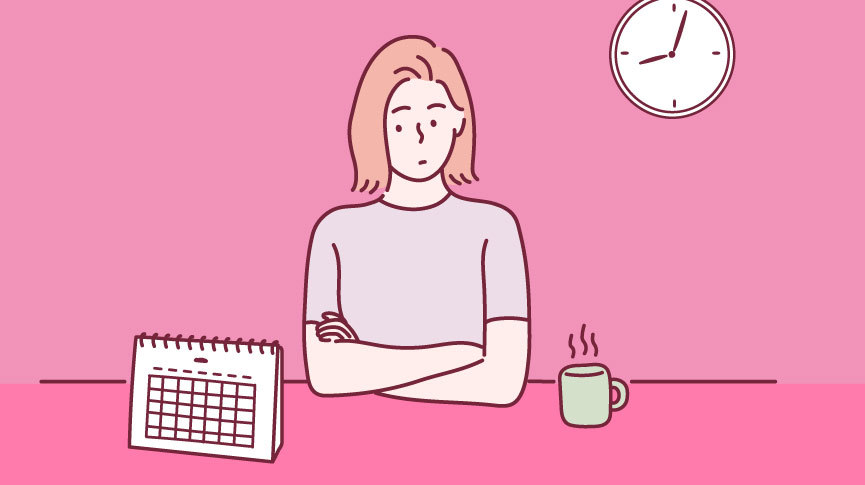All About Anovulation

Most of us have a basic understanding of ovulation, the process where the female body releases one or more eggs, typically monthly, in hopes of becoming fertilized. If these eggs are not fertilized they turn into your period!
Now, what if the ovulation process never occurs in the first place?
This is called anovulation, or the lack or absence of ovulation during a menstrual cycle.
What is anovulation? Symptoms of anovulation? Why does it happen to certain people? How might it affect fertility?
Holy Hormones
While most people who menstruate will experience anovulation every once in a while, if it is a regular occurrence it is most likely due to some sort of hormonal imbalance.
Estrogen and progesterone are the hardworking hormones that remind the ovaries when it’s time to release a mature egg each month. When these hormones are out of balance, this process is disrupted.
This tells us what, but it doesn’t tell us why, or the root cause of anovulation.
Birth Control
For people who have been on hormonal birth control like the pill, and IUD, or patch, it may take some time after discontinuing HBC for their cycle to regulate again.
Most hormonal birth controls work by suppressing ovulation, which means sometimes the body just needs a bit of time to adjust after going off of it.
You’re Young
When people are at the beginning of their menstruating years, their body often takes some time before regulating their cycle. Which may mean irregular cycles and occasional anovulation.
Young menstruators can help support ovulation and cycle regulation by practising healthy lifestyle choices and getting to know their body by tracking their cycle.
Big Changes
The menstrual cycle is often considered a vital sign, because of its ability to highlight other underlying issues that may be going on.
Stress, grief, excess weight loss or gain, vigorous workouts, and certain medications can all cause someone to have an anovulatory cycle.
PCOS
Polycystic Ovarian Syndrome, PCOS, affects an estimated 8-20% of people who menstruate worldwide. People with PCOS may have unwanted excess body hair, acne, weight gain, and pelvic pain.
The ovarian cysts caused by this condition can disrupt ovulation, which may affect fertility.
Hypogonadotropic Hypogonadism
Hypogonadotropic Hypogonadism, HH, is when the testes or ovaries produce little or no sex hormones.
In the case of anovulation, the ovaries are not producing the hormones necessary for ovulation.
HH can be caused by any number of factors including damage to the hypothalamus or pituitary gland (which helps the body regulate hormones), genetic factors, opioid or steroid use, chronic inflammation or infections, and severe stress.
Depending on the cause of HH, it may or may not be reversed, which would allow ovulation to occur.
Pregnancy
If you skip a cycle of ovulation, but still seem to get a “period”, it’s possible that you’re pregnant.
For people early on in their pregnancy, they may experience “implantation bleeding”, which is when a fertilized egg implants on the uterine wall. Occasional spotting is not abnormal in pregnancy, but you’ll want to track it and let your provider know of any changes.
Perimenopause
As the body begins to stop producing estrogen, a menstruating person enters perimenopause, aka “pre-menopause”.
When someone starts nearing the end of their menstruating years, their period may become irregular, or they’ll skip it on random months.
With fewer ovulation cycles, someone’s ability to conceive starts to drop.
For those hoping to get pregnant during this time, fertility treatments like in vitro fertilization, IVF can help increase their chances of conceiving. Of course, this process can be incredibly expensive and take time.
Can You Still Get a Period if You Don’t Ovulate?
The short answer is yes (sort of), and this is the case for many people who are on hormonal birth control.
During the first half of the menstrual cycle, the body works hard to build up the endometrium, or lining of the uterus, to prepare for a possible pregnancy. Even if the body does not ovulate, if there is endometrium built up, and the body will need to shed it via the vagina.
While this is not technically a “period”, it will look like one, and you may not even know that you didn’t ovulate.
Anovulation and Pregnancy
For people who regularly experience anovulation, it can make conceiving a difficult and emotional journey.
Unfortunately, you cannot get pregnant during a menstrual cycle where you don’t ovulate. If this is a regular occurrence, this is a possible sign of infertility.
The ability to conceive for people who don’t regularly ovulate depends on the cause of anovulation.
Some may be able to increase their chances of conceiving with lifestyle changes like a healthy diet, exercise, and supplements. Others may turn to methods like hormone therapy and IVF, like we mentioned earlier.
In addition to these methods or inplace of them, people may be able to regulate ovulation through holistic therapies like acupuncture and functional medicine.
It can be helpful to track your periods using a period tracking app, or cycle journal so that you can try to gauge when you do or don’t ovulate. A regular cycle is a good indicator of ovulation!
The Bottom Line
When it comes down to it, anovulation is a symptom of a broad range of possible conditions or side effects. If anovulation is affecting your physical and/or mental health, there may be steps you can take to help regulate your cycle, and your life.
Facts Checked By:

Dr. Shree Datta is a Consultant Obstetrician and Gynaecologist in London, specialising in women’s health including all menstrual problems such as fibroids and endometriosis. Dr. Shree is a keen advocate for patient choice, having written numerous articles and books to promote patient and clinician information. Her vision resonates with INTIMINA, with the common goals of demystifying periods and delivering the best possible care to her patients.
Article written by:

Natasha (she/her) is a full-spectrum doula and health+wellness copywriter. Her work focuses on deconstructing the shame, stigma, and barriers people carry around birth, sex, health, and beyond, to help people navigate through their lives with more education and empowerment. You can connect with Natasha on IG @natasha.s.weiss.



hi my period was supposed to start around the 26 or 27 of this month but i havnt recieved it recently i been cramping in still no period